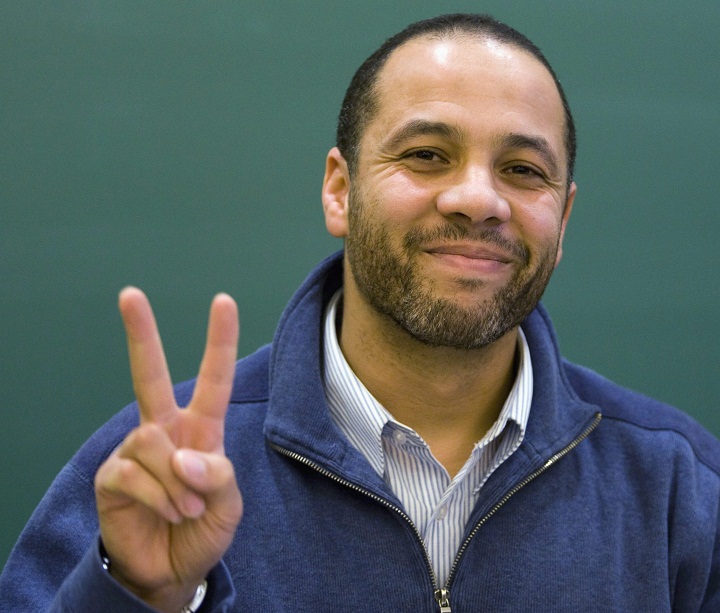MONTREAL — Adil Charkaoui, president of the Islamic Community Centre Montreal East, blasted the decision by two Montreal CEGEPs to suspend leases granted to his Arabic schools.

Charkaoui spoke to the media Friday after his contract to rent space at the Collège de Maisonneuve was cancelled.
The cancellation came in the wake of the disappearance of four students from the school, part of a group of six people from Montreal and Laval who are suspected to have gone to Syria.
One of the schools defended the decision, saying a video circulating online suggested the activities of the school and the college’s values were at odds.
Charkaoui says one of the six briefly attended courses offered by his school, which he says focuses on teaching religion and the Arab language.
Charkaoui says only found out this week from a journalist that a former student was among the six.
The association rented space from the colleges for weekend courses and Charkaoui said he’s considering legal recourse.
Global News has confirmed that all of the teens are missing, and that the group consisted of two females and four males.
READ MORE: Politicians urge families to contact authorities after 6 teens allegedly left Quebec for Syria
The father of one of the missing students, 18-year-old Bilel Zouaidia from Laval, told the French-language paper La Presse he was frustrated with how his son had been manipulated.
He also mentioned he was concerned about religious and Arabic courses his son was taking at the college.

Get daily National news
These were offered in rented premises in the college every Sunday by the Islamic Community Centre Montreal East, under Charkaoui, who is also a spokesperson for the Quebec Collective Against Islamophobia.
READ MORE: Court appearance for young man RCMP fears will commit a terrorist act
Zouaidia’s father told La Presse that, concerned about Charkaoui’s reputation, he had forbidden his son to attend the classes.
The Canadian Security Intelligence Service (CSIS) believed Charkaoui had trained at a jihadist camp in Afghanistan.
In May 2003, he was controversially arrested by the Canadian government under a security certificate signed by then-federal immigration minister, Denis Coderre.
After being imprisoned without charge or trial until 2005, he was released under certain conditions which limited his movement and access to the Internet.
In 2009, these conditions, and the security certificate, were lifted.
Charkaoui has denied all of the allegations against him.
In an interview with La Presse, Charkaoui said Zouaidia had attended his classes in the fall but quit after two months.
Desjardins said Thursday that the school was immediately cancelling its rental agreement with Charkaoui.
Global News has confirmed that the group went to Turkey, a known entry-point for those looking to join militants in Syria.
WATCH: Mike Armstrong has the details on the six young Canadians who are suspected to have joined Islamic militants in Syria.
French-language newspaper La Presse said the group was feared to have continued on to Syria from Turkey. It said Canadian authorities have lost all trace of them.
A school in shock
The head of a Montreal college expressed shock Thursday after learning that four of the teens were students at her school.
WATCH: Brigitte Desjardins from the Collège de Maisonneuve in Montreal talks about the challenges of identifying and addressing the issue of radicalization in Quebec education institutions.
“We just found out they were two girls and a male and this morning another male,” Brigitte Desjardins from the Collège de Maisonneuve told Global News.
“With the information we got, it’s probably two women and two men, just over 18.”
These four students from Montreal were joined by two more young women from Laval. In mid-January, they all reportedly flew to Syria by way of Turkey from Montreal-Trudeau Airport.
READ MORE: Radicalization and ISIS: What’s the threat to Canada?
Montreal police were first alerted by concerned family members and the file was transferred to the RCMP. A Laval police spokesperson also confirmed that its files on the missing girls had been handed over to the RCMP.
Officials from all three agencies were not commenting, as an investigation is ongoing.
Identifiying radicalization
“If a father doesn’t realize, how can a school,” the head of Collège de Maisonneuve told Global News that knowing whether a student had become radicalized is very challenging.
“Tell me, how I can tell you are a Muslim or not?” she said. “This is a big question.”
“Where are they? They’re not going around the school with a big poster on them saying, ‘I’m going to Syria.'”
“There’s no profile. This is what is difficult.”
READ MORE: New school program ‘Extreme Dialogue’ to fight radicalization of Canadian youth
There was clearly some concern in this case, as Zouaidia’s father met with Charkoui and had confiscated his son’s passport, however, he maintained that his son had not been raised to be susceptible to radicalization.
“I brought up my sons saying ‘You are a Quebecer, you are Canadian. We don’t spit on the country that welcomes us.’ Until he disappeared, my son was well-raised, a model.”
With files from The Canadian Press






Comments
Comments closed.
Due to the sensitive and/or legal subject matter of some of the content on globalnews.ca, we reserve the ability to disable comments from time to time.
Please see our Commenting Policy for more.